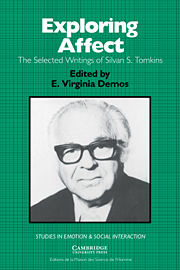Book contents
- Frontmatter
- Contents
- Foreword
- Editor's preface
- List of contributors
- Chronology
- Introduction
- Part I Affect theory
- Introduction
- Selections by Silvan S. Tomkins
- Part II Affect and ideology
- Introduction
- Selections by Silvan S. Tomkins
- Part III The face of affect
- Introduction
- Selections by Silvan S. Tomkins
- Part IV Script theory: The differential magnification of affect
- Introduction
- Selections by Silvan S. Tomkins
- Part V Human being theory: A foundation for the study of personality
- Introduction
- Selections by Silvan S. Tomkins
- A complete annotated bibliography of Silvan S. Tomkins's writings
- References
- Author index
- Subject index
- Titles in the series
Foreword
Published online by Cambridge University Press: 10 November 2010
- Frontmatter
- Contents
- Foreword
- Editor's preface
- List of contributors
- Chronology
- Introduction
- Part I Affect theory
- Introduction
- Selections by Silvan S. Tomkins
- Part II Affect and ideology
- Introduction
- Selections by Silvan S. Tomkins
- Part III The face of affect
- Introduction
- Selections by Silvan S. Tomkins
- Part IV Script theory: The differential magnification of affect
- Introduction
- Selections by Silvan S. Tomkins
- Part V Human being theory: A foundation for the study of personality
- Introduction
- Selections by Silvan S. Tomkins
- A complete annotated bibliography of Silvan S. Tomkins's writings
- References
- Author index
- Subject index
- Titles in the series
Summary
In the last year of his life, despite a continuing battle with pain, Silvan Tomkins sent to his publisher the final two volumes of his major work, Affect, Imagery, Consciousness. Almost 30 years had elapsed since his analysis of the role of affect in human experience and since his theory of the origin and development of the positive and negative affects had opened a new path in the study of the emotions. In the intervening years he struggled to understand the negative affects, fear and anger, and to delineate the major aspects of script theory, an attempt to account for the development of signature aspects of personality from an analysis of the progression of the affective life of an individual or of a culture. His death, on June 10, 1991, surely evokes the oft-reported lament concerning the passing of an era of “grand theorists.” He was certainly that.
Born June 4, 1911, to parents who had emigrated from eastern Europe to Philadelphia, he and his only sibling, a younger sister, experienced childhood in a large, warm extended-family setting. This background was undoubtedly influential in establishing his life patterns. He was an unusually affiliative person, a characteristic clearly identified by all who knew him. His father, a dentist, settled his family each summer on the New Jersey shore. It was a scene to which Silvan was certain he became addicted because of the abundance of positive affect generated in that surround.
- Type
- Chapter
- Information
- Exploring AffectThe Selected Writings of Silvan S Tomkins, pp. vii - xiiPublisher: Cambridge University PressPrint publication year: 1995



